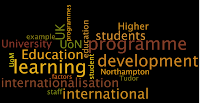Out of Sight, Out of Mind: Capturing the Distance (Online) Learner Experience
Abstract
This work in progress paper presents the findings of a small scale study conducted to gain insight into the ‘distance learner’ experience at a higher education institution. The study was undertaken in support of a wider project to improve and enhance online learning. Primary research was undertaken by an undergraduate student who conducted virtual focus groups with currently enrolled students using face to face video technology. This report documents the method and limitations of undertaking the research and summarises participants’ thoughts. Initial outcomes from the study suggest that students are generally content with learning and teaching online, but experience frustration with aspects of administration and course material signposting. Participants make a number of recommendations for overall improvement and this report concludes with plans for going forward and embedding their ideas into the wider project and developing opportunities for further student input to their learning.
Keywords
Online learning; distance learning; student experience; online focus groups; student voice.
Full Text:
PDFReferences
Alkema, A., McDonald, H. and Ryan, R. (2013) Student Voice in Tertiary Education Settings: Quality Systems in Practice. New Zealand: Heathrose Research. Available online: http://akoaotearoa.ac.nz/projects/student-voice-effective-representation-and-quality (accessed 19/11/13).
Bokor, J. (2012) University of the Future: A thousand year old industry on the cusp of profound change. Australia: Ernst & Young Higher Education Report. Available online: http://www.ey.com/Publication/vwLUAssets/University_of_the_future/$FILE/University_of_the_future_2012.pdf (accessed 19/11/13).
Chen, K. and Jang, S. (2010) ‘Motivation in online learning: Testing a model of self-determination theory’. Computers in Human Behavior, 26 (4): 741–752. http://dx.doi.org/10.1016/j.chb.2010.01.011
Diaz, D. and Cartnel, R. (1999) ‘Students' Learning Styles in Two Classes: Online Distance Learning and Equivalent On-Campus’. College Teaching, 47 (4): 130-135. http://dx.doi.org/10.1080/87567559909595802
Evidence Base (2011) Focus Groups. eValued: An evaluation toolkit for e-library developments. Available online: http://www.evalued.bcu.ac.uk/tutorial/4b.htm (accessed 19/11/13).
Halcomb, E. J., Gholizadeh, L., DiGiacomo, M., Phillips, J. and Davidson, P. M. (2007) ‘Literature review: considerations in undertaking focus group research with culturally and linguistically diverse groups’. Journal of Clinical Nursing, 16 (6): 1000–1011. http://dx.doi.org/10.1111/j.1365-2702.2006.01760.x
Hartnett, M., St. George, A. and Dron, J. (2011) ‘Examining motivation in online distance learning environments: Complex, multifaceted, and situation-dependent’. The International Review of Research in Open and Distance Learning, 12 (6): 20-37.
Inman, E., Kerwin, M. And Mayes, L. (1999) ‘Instructor and student attitudes toward distance learning’. Community College Journal of Research and Practice, 23 (6): 581-591. http://dx.doi.org/10.1080/106689299264594
Lee, S. J., Srinivasan, S., Trail, T., Lewis, D. and Lopez, S. (2011) ‘Examining the relationship among student perception of support, course satisfaction, and learning outcomes in online learning’. The Internet and Higher Education; 14 (3): 158-163. http://dx.doi.org/10.1016/j.iheduc.2011.04.001
Paechter, M., Maier, B. and Macher, D. (2010) ‘Students’ expectations of, and experiences in e-learning: Their relation to learning achievements and course satisfaction’. Computers & Education, 54 (1): 222–229.http://dx.doi.org/10.1016/j.compedu.2009.08.005
Page, L. (2013) Lectures in your living room: Meet the online learners who fit study around their lives. The Guardian Online (12th November 2013). Available online: http://www.theguardian.com/education/2013/nov/12/online-learning-students-benefits (accessed 12/11/13)
Samarawickrema, G. and Stacey, E. (2007) ‘Adopting web-based learning and teaching: A case study in higher education’. Distance Education, 28 (3): 313–333. http://dx.doi.org/10.1080/01587910701611344
DOI: http://dx.doi.org/10.14234/elehe.v5i1.76
The Journal Enhancing the Learner Experience in Higher Education can be found at: http://journals.northampton.ac.uk/index.php/elehe/index
